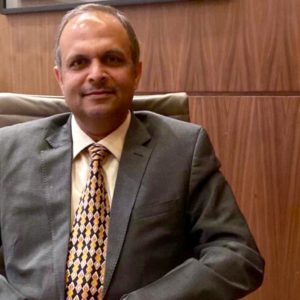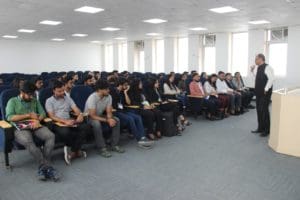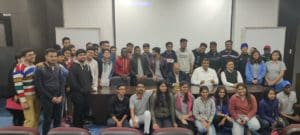Changing Mindsets on How we Conceive Dispute Resolution. Member Spotlight: Sameer Shah
When Sameer started his Law studies in 1994, he had not foreseen that mediation would become his passion and main dedication in life. As of today, Sameer Shah is a highly qualified lawyer, arbitrator and, above all, a mediation practitioner with 25 years of active practice and experience with hundreds of solved disputes in its portfolio. Besides, Sameer’s dedication to mediation led him to broaden his action as a mediation promoter. In fact, he is currently teaching and organizing training as well as coaching sessions. In order to promote mediation into society, Sameer organizes various types of learning activities for law school students as well as he is involved in organizing trainings for aspirant mediators and arbitrators. “Whatever I do, I do it for giving back to society what life has given to me. It may seem a lot to do, having a busy working life, but it is my passion, so it turns out to be satisfying and not burdening as one may think.”
From law to peace, from litigation to mediation
 He earned a Bachelor’s degree in Law at the University of Delhi, and immediately after started practicing as a Senior Associate for a law firm in Ahmedabad, his native town. As a key expert in arbitration and litigation processes, Sameer began earning confidence with multiple areas of dispute resolution expertise, having to deal with a wide range of legal cases, from commercial disputes to matrimonial cases. Such experience brought him to establish his own legal firm in 2003, the S.U. Shah & Associates, that assists various groups of clients with different needs. As a lawyer, he is also currently a Senior Partner of one of the most renowned legal firms of India – Trust Legal Advocates & Consultants.
He earned a Bachelor’s degree in Law at the University of Delhi, and immediately after started practicing as a Senior Associate for a law firm in Ahmedabad, his native town. As a key expert in arbitration and litigation processes, Sameer began earning confidence with multiple areas of dispute resolution expertise, having to deal with a wide range of legal cases, from commercial disputes to matrimonial cases. Such experience brought him to establish his own legal firm in 2003, the S.U. Shah & Associates, that assists various groups of clients with different needs. As a lawyer, he is also currently a Senior Partner of one of the most renowned legal firms of India – Trust Legal Advocates & Consultants.
Sameer never studied mediation, but as the years passed, he got into contact with colleagues and experts that gradually induced him to it. It did not pass long for mediation processes to become his passion. “During my early career, I realized that alternative dispute resolution mechanisms such as arbitration were unable to provide the required solution to the range and quantity of disputes in India. That is the reason I got passionate into mediation, which I believe to be the most effective amongst all the ADR methods.” In his activity as a mediator, Sameer deals with a great variety of cases but he prefers not to conform himself to a strict and rigid scheme of mediation. After all, the power of mediation undoubtedly lies in the flexibility and openness of the process, which adapts according to the necessities and attitudes of the parties. In this way, Sameer applies and mixes various types of mediation (facilitative, transformative and evaluative) depending upon the case.
But Sameer does not like to limit himself. Aside from being an active mediator, his engagement with mediation covers various areas and scopes. For instance, he makes parts of several authoritative bodies engaged with mediation worldwide, such as the Hong Kong Joint Mediation Centre and the Alliance for Equality in Dispute Resolution. Finally, Sameer is deeply committed to awareness-raising efforts aimed at broadening the impact of mediation within Indian society. As a promoter of mediation, he organizes workshops, seminars, and trainings to Senior Law university students in order to sponsor the effectiveness of mediation processes and shape their attitudes towards the way disputes resolution is perceived. During several years, he has also been an organizer and Panel Arbitrator of several Moot Competitions in India and Honk Kong. For those unfamiliar with this term, a Moot Competition gathers aspiring arbitrators and mediators in a simulation of various dispute resolution processes, in order to equip them with the first-hand experience and enhance their professional skills in mediation.
Throughout the years spent dealing with litigation, arbitration, and mediation cases, Sameer reached a conclusion: “Mediation undoubtedly stands as the most effective and passionate way to solve disputes. One of the greatest advantages of mediation is its lack of staticity, rule-wise.” Indeed, letting alone a few basic rules such as confidentiality, mediation provides a needs-based structure that is capable to vary from dispute to dispute. Here a key role is played by the capacity of the mediator to be sensitive, receptive, empathetical to the needs and reservations of the parties. Additionally, the fact that mediation lies in non-binding principles and outcomes results in more attractive, especially for more informal cases such as commercial transactions or family disputes.
Mediation gaining momentum

In comparison to arbitration, Sameer believes mediation to draw its strength from the fact of being much more flexible and informal, “this allows the parties to open more easily and being more prone to say what they really want to say, without fears of legal repercussions,” he asserts. It goes without saying that such an open-minded process is more likely to pave the way for a genuine conversation among disputing parties. “As either miscommunication or lack of communication often represents the core of the problem, a process that is able to allow such informality and flexibility is likely to lead the parties to communicate in a more effective way,” Sameer adds.
Sameer is strongly convinced that mediation is increasingly gaining momentum in the Indian society and he devotes a great number of his professional efforts to this goal. If mediation was scarcely considered until a few years ago, its above-mentioned characteristics and pros with respect to other dispute resolution techniques are attracting more and more people towards choosing it to settle their own controversies. In India and elsewhere, what is needed is a more sustained awareness-raising action in order to bring it within the reach of everyone. Noticeably, this can prove to be challenging if the socio-political textile is highly diversified in culture and ethnicity as in India. Nevertheless, Sameer demonstrates great enthusiasm for the advancements that his country is achieving in this respect. In fact, India is among the main signatories and promoters of the Singapore Convention on Mediation. Plus, the Indian government has taken great steps in the last few years in promoting mediation within dispute settlement processes.
 Just to mention one example, the Chief Justice of India has recommended for framing guidelines for Law Schools in India to include a specific curriculum on mediation in their academic curricula. In fact, the Honorable Supreme Court of India has also constituted a committee of experts to frame Mediation Law for the country. Surely, an unprecedented result if compared to Western countries. However, what is really needed, and yet partially lacking, in Sameer’s view is a broad paradigm shift in the way dispute resolution practitioners perceive conflict resolution. “An essential part of expanding the outreach of mediation is represented by a total change of practitioners’ mindset in order to see conflict in a holistic way rather than an offensive one.
Just to mention one example, the Chief Justice of India has recommended for framing guidelines for Law Schools in India to include a specific curriculum on mediation in their academic curricula. In fact, the Honorable Supreme Court of India has also constituted a committee of experts to frame Mediation Law for the country. Surely, an unprecedented result if compared to Western countries. However, what is really needed, and yet partially lacking, in Sameer’s view is a broad paradigm shift in the way dispute resolution practitioners perceive conflict resolution. “An essential part of expanding the outreach of mediation is represented by a total change of practitioners’ mindset in order to see conflict in a holistic way rather than an offensive one.
Shortly, disputes can be tackled in a more comprehensive and flexible way if they are seen through the appropriate lenses, rather than immediately triggering a traditional dispute resolution mindset which often results detrimental to parties’ relations and attitudes among each other. Therefore, the key to an effective conflict resolution must be “A change in the mindset of mediators towards focusing more on understanding the underlying roots of the conflict and elaborating alternative strategies to tackle such roots causes without passing through the Court. Only if this shift happens, ADR processes can effectively achieve a settlement of the conflict without risking to amplify it.”
Sameer has joined MBBI only in recent times but he is already eager to bring MBBI impact to India. As he had the opportunity to know the work of the organization, he immediately got attracted by the degree in which MBBI’s mission overlaps with his own professional ideals and efforts, for the benefit of the overall society. “I find MBBI to be such an amazing platform to work collectively for the promotion and development of mediation within the global society,” Sameer is thrilled to mention.
Written by Matteo Piovacari: MBBI Writer
